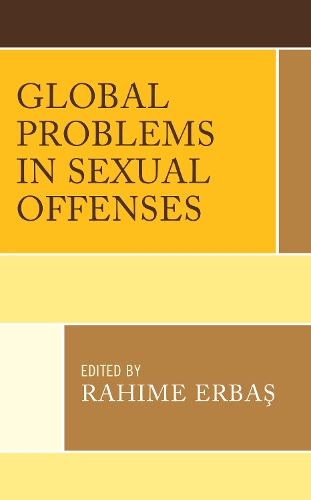
Global Problems in Sexual Offenses
(Hardback)
Publishing Details
Global Problems in Sexual Offenses
By (Author) Rahime Erbas
Contributions by Francesco Angelone
Contributions by Angela Caruso
Contributions by Chara Chioni-Chotouman Chara Chioni-Chotouman
Contributions by Aleksandra Deanoska-Trendafilova
Contributions by Carmen Domocos
Contributions by Rahime Erbas
Contributions by Lara Ferla
Contributions by Gordana Gasmi
Contributions by Aleksandra Gruevska Drakulevski
Bloomsbury Publishing PLC
Lexington Books
21st June 2022
United States
Classifications
Professional and Scholarly
Non Fiction
Criminal procedure
Law and society, gender issues
345.0253
Physical Properties
Hardback
232
Width 159mm, Height 227mm, Spine 20mm
540g
Description
Sexual offences pose severe violations of human rights that necessitate criminal law intervention in every democratic society. Using a holistic and integrated approach, this book examines sexual offenses through criminal law and criminal procedure within different jurisdictions. Impunity or lenient punishment enjoyed by perpetrators appears as a fundamental concern and contribute to low(er) reporting rates. Attrition, from the perspective of criminal law, is not only caused by issues in criminal procedure, like a lack of victim support or insufficient evidence, but is primarily linked to the definition of sexual offences which is hugely influenced by society, culture, and political power. Stereotypes that are deeply rooted in society in the form of common myths such as: victim of sexual offences are always female(s), or sexual offences take place outside of marriage, or that the victim has an obligation to manifest a resistance, or a woman accepting a gift by a man shows she consented to sexual acts and many others that are impediment to combatting sexual violence. These myths are not just maintained by society, but they also affect the victims decision to seek justice, as well as the judiciarys approach to victims and the polices attitudes towards victims. Using cases and legislation from Croatia, Greece, Italy, North Macedonia, Romania, Serbia, and Turkey, and comparing them to United Kingdom, Germany, the Netherlands and the United States, this book presents peculiarities stemming from society, culture, politics, historical facts and even religion, along with solutions to the global problems of sexual offenses. This book is of interest to scholars studying criminal justice, legal studies, sociology, and cultural studies
Reviews
Bring those accused of a crime to justice ought to be a paramount goal for any functioning criminal justice system. Violence against woman has plagued different jurisdiction for centuries. However, as an evolved and enlightened society it would be right to expect that this problem to have subsided as our investigations, pre-trial processes and complaint care has improved and evolved. However, as this book readily expressesthere are myriad issues and concerns surrounding the investigation, prosecution and conviction of those accused of sexual offences. In England and Wales alone, there were 52,210 rapes recorded by the police in 2020. Only 843 resulted in a charge or summonswhich is an appalling rate of 1.6%. Cases of rape and sexual assault are undoubtedly some of the most challenging and sensitive to prosecute. However, it is clear much more needs to be done in terms of how complainants are treated by those investigating the alleged offence, the pre-trial process and the trial itself. As this book illustrates, problems surrounding this area are not exclusively problematic for England and Wales. This collection offers insight and perspectives from Turkey, Greece, The Republic of North Macedonia, Romania, Republic of Croatia and Serbiaall of whom express deep concern regarding this problematic area. The book is timely and not only looks at difficulties with the law around sexual offences but also how complainants can be better protected and respected as well. These are interwoven issues in this field and needs better recognition. The book goes some way to illuminate these issues and offers examples on how reform can take place. Policy makers around the globe as an issue have recognized gender-based violence and yet, still not enough is being done to tackle this issue and protect those who make allegations of crimes. It is likely this problem has been exasperated by the COVID-19 restrictions and the enforced lockdown around the world. Effectively, complainants have been locked in their homes with their attacker. As highlighted in this book, the violence suffered can take many different forms. But it is clear than the powerful issues advanced by this collection needs an equally powerful answer from policy makers.
-- Ed Johnston, University of NorthamptonThe book edited by Rahime Erba faces a global challenge: the dangerous liaison between gender stereotypes and criminal law in response to sexual offenses. By carrying out a comprehensive and in-depth analysis, the book offers inspiring insights into high attrition and low reporting rates of sexual offences. Due to the socio-cultural roots of the phenomenon, it is clear that criminal justice response risks being insufficient, as a determined cultural change is the linchpin of the contrast to gender-based violence.
-- Valentina Bonini, Pisa UniversityAuthor Bio
Rahime Erba is assistant professor in criminal law at Istanbul University.
